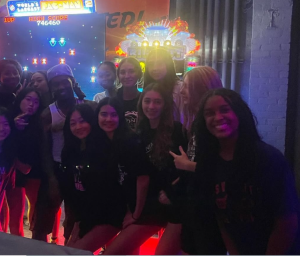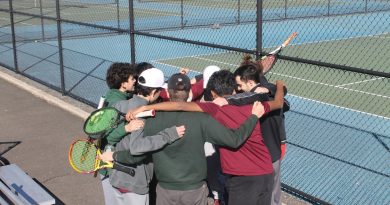The Secret to Success: How Team Bonding Fuels Performance
Picture this: you’re on a sports team, about to face your biggest rivals of the season. You can hear the crowd roaring, but you’re locked in–your focus is solely on your teammates. You’ve spent countless hours together—training, celebrating victories, and learning from defeats. The bond between you is unshakable, and it’s that deep sense of trust and unity that fuels your success. But now, imagine the opposite: you’re on a team where no one knows each other, no one trusts each other, and on one is truly working towards the same goal. In this scenario, even the most talented people will struggle to perform as a cohesive team.
The key to success, time and time again, lies not in individual brilliance, but in the strength of the relationships between team members.
Team bonding isn’t just a buzzword—it’s a game changer. But the question remains: Does team bonding actually translate to better performance? At Leonia High School, where students work together from clubs to sports, it’s imperative to examine whether building strong team bonds truly leads to better results.
What is Team Bonding?
At its core, team bonding refers to activities or experiences that strengthen the emotional connections between team members. This might include team building exercises, informal hangouts, or even shared experiences for group members to get to know each other. The idea is that when team members feel more comfortable with one another and trust each other, they will communicate more effectively, work more efficiently and ultimately perform better. But does bonding really lead to these improvements, or is it just a feel-good exercise, without much impact to actual performance?
Does it really work?
To find out, I spoke to multiple Leonia athletes. Gianna Mele ‘26, a member of the Leonia Girls Soccer team, shared her experience with team bonding. Gianna and her teammates came together for a potluck event held in one of their team members’ buildings. “We had a potluck, played a lot of games, listened to music, and just got to know each other better,” Gianna recalled. “It really helped us break the ice and feel more connected.” For Gianna, the impact was undeniable: “After bonding like that, our communication on the field improved drastically. We became more confident in giving and receiving suggestions, and we supported each other in ways we hadn’t before.”
But the benefits of bonding went beyond just skill improvement. It also shifted the team’s mindset. “Even after a loss,” Gianna shared, “it doesn’t feel discouraging. You still love your team, and that love keeps you focused on growth rather than getting bogged down by mistakes.” This shift in mentality is key: when a team is united by more than just a common goal, they can weather challenges together, learning and improving as they go.
This shift in mentality is echoed by Tiana Pekar ‘25, the captain of the Leonia Girls Cross Country team. Tiana explains that her team’s bond has been crucial in their performance. “We’ve had team bonding activities like lunches and dinners, and sometimes someone on the team will host something at their house,” Tiana described. “I think these events have really helped us connect,” she added. When questioned whether she’s seen a shift in performance due to team bonding, from her freshman to now senior year. She notes, “I think this is the closest we’ve been since I was a freshman.” Tiana later highlighted how this strong bond has translated into improved performance. “We understand each other’s goals now,” she explained. “At our team dinners and practices, we come together for our goals. Some of us want to PR [personal record] or improve our times, and as league champions, we started talking about race strategies—like who wants to aim for what place. That way, we’re all working together.” For Tiana, the connection with her teammates has made a real impact on how they approach races and training. Further emphasizing, the positive impact team bonding has had both on their teams and their performance as league champions.
Livia Xhako ‘26, a varsity member of the Leonia Girls Volleyball team, shared a similar experience. Livia recalled an outing to Urban Air, an indoor trampoline park, where the team stumbled upon rapper Offset. “It was random, but we shared this moment that was completely outside of volleyball, and it really brought us closer.” She went on to explain, “We played better as a team because we had this unspoken understanding of each other. When we knew each other better off the court, it made a huge difference on the court and in our performance.” Livia’s story underscores how bonding outside of practice can strengthen team chemistry, which ultimately impacts performance on the court.

The Bigger Picture
Gianna, Tiana and Livia’s experiences point to a larger truth: team bonding is not just about having fun—it’s about building trust and chemistry. As Gianna put it, “Team bonding helps you combine individual skills. When you trust each other, you work together better, win together, and support each other no matter what happens.”
At Leonia High School, athletes are finding that these connections translate directly into better performance. Whether it’s a potluck, a trampoline park outing, or other team-building activities, these shared experiences create a foundation of trust that improves both on-field communication and resilience in the face of challenges.
Conclusion
The benefits of team bonding are clear: when athletes forge genuine connections outside of practice, they are better equipped to communicate, trust, and support each other during competition. Talent may win games, but it’s these emotional connections that elevate a team’s performance. By investing in relationships, athletes don’t just enhance their skills—they build a foundation for long-term success, both on and off the field.


